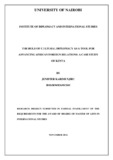| dc.description.abstract | This research project sets out to investigate the role of cultural diplomacy as a tool for
advancing international relations using Kenya as a case study. Cultural diplomacy may
best be described as a course of action(s), which are based on and utilize the exchange of
ideas, values, traditions and other aspects of culture or identity, whether to strengthen
relationships, enhance socio-cultural cooperation or promote national interests. Cultural
relations, is the mutual exchange of culture between peoples to develop long-term
relationships, trust, and understanding for the purpose of generating genuine goodwill and
influence abroad. The study aims to establish the role of cultural diplomacy as a tool for
advancing African foreign relations using Kenya as a case study. Specifically the study
seeks to answer the following questions: what is the role of cultural diplomacy in
advancing foreign relations in Africa? What the role music as an aspect the culture, what
the role sports as an aspect the culture and the role of cultural Diplomacy in advancing
Kenya‟s foreign relations?
The justification for the study is that Cultural diplomacy has not been the subject of as
much scholarly attention and Scholarship about diplomacy - a more traditional field - has
paid little attention to cultural diplomacy, and despite the recent exponential growth in
scholarship of the various schools of International Relations Theory, Cultural diplomacy
has been almost entirely ignored by the discipline of International Relations. The study
will therefore contribute to knowledge and will be useful to policy makers, especially
those in government to make better use of the practice of cultural diplomacy, to enhance
effectiveness in reaching wider and diverse audiences.
The study employs soft power theory as the analytical framework. It posits that Soft
Power lies in the ability to attract and persuade. Soft power arises from the attractiveness
of a country's culture, political ideals, and policies. This study uses qualitative research
approach and majorly utilizes secondary for data collection from books, journal articles
and periodicals. For primary data is collected using a questionnaire. The collected data is
sorted and analyzed using document analysis and presented in narrative form as well as in
tables and charts.
This study argues that cultural diplomacy is very important for Africa and concludes that
Cultural diplomacy plays a crucial role in building relations among states in contemporary
international relations, as it serves as an effective instrument in supporting national
foreign policy objectives or a constructive channel at times of political difficulty. Cultural
diplomacy as a subset of public diplomacy supports Kenya‟s foreign policy goals, to
combat stereotyping, develop mutual understanding, and advance national reputation and
relationships across the board. Culture keeps doors open in difficult times, where cultural
diplomacy provides a safe and constructive forum for relationship-building or easing
relations when they get strained. Among others, the study recommendations that Prior to
constructing a cultural diplomacy initiative, the government, relevant agencies, artists and
other actors must fully understand the cultural identity of the nation. | en_US |



